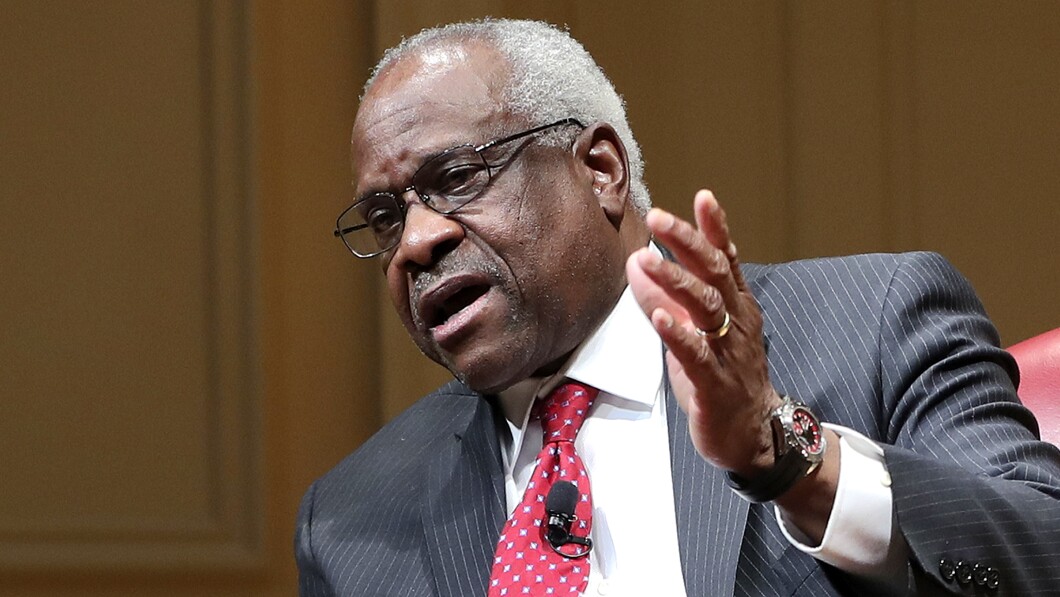
Harlan Crow, a Republican donor who paid for trips and purchased property from Supreme Court Justice Clarence Thomas, accused the media of a “political hit job” against the eldest member of the high court.
Thomas has been at the center of ethics questions surrounding reports on his fraternal relationship with Dallas-based Crow, who invited the justice to vacation on several trips outside the United States and purchased at least three properties from Thomas in 2014 with the intent of turning one, his childhood home, into a museum. Due to a failure to report these events, some Democratic lawmakers are calling on the Justice Department to investigate Thomas.
CALLING CLARENCE THOMAS TO TESTIFY COULD IGNITE ‘DEFCON ONE’ JUDICIARY IMPASSE

Two weeks after the ProPublica report emerged on their previous vacations, Crow spoke to the Dallas Morning News for his first interview on Monday to “set the record straight.”
“I think it’s a political hit job,” Crow said, adding his belief “that the media, and this ProPublica group in particular, funded by leftists, has an agenda to destabilize the [Supreme] Court. What they’ve done is not truthful. It lacks integrity. They’ve done a pretty good job in the last week or two of unfairly slamming me and, more importantly than that, unfairly slamming Justice Thomas.”
Days after the travel stories, ProPublica released a second report on Thomas, detailing the justice’s sale of three properties in Georgia to Crow in 2014, two of which were vacant lots that Crow later developed and one being the house where Thomas’s mother, Leola Williams, lives.
Citing a post-Watergate federal disclosure law requiring justices and other officials to reveal details of most real estate sales over $1,000, the outlet noted four ethics law experts said Thomas’s failure to report the sale might be a violation of the law.
A source said Monday that Thomas didn’t think he needed to disclose the sale because he lost money on the deal, according to CNN. The justice will review the forms and amend as appropriate, the source added.
Crow owns the home where the justice’s mother still lives. She lives there rent-free but is responsible for paying insurance and property taxes.
Thomas and his wife put $50,000 to $70,000 into his mother’s home for capital improvements, according to the source. After the sale was completed, Thomas’s proceeds were $44,000, according to the source. Since there was no gain, Thomas believed there wasn’t a need to report the sale.
Democrats, including Sen. Sheldon Whitehouse (RI) and Rep. Hank Johnson (GA), who have both introduced legislation for heightened ethics rules on the judiciary, have asked Chief Justice John Roberts to launch an investigation into Thomas and have asked the Judicial Conference to refer Thomas to Attorney General Merrick Garland for possible violations of the Ethics in Government Act of 1978.
Gabe Roth, the founder of Fix the Court, which advocates greater transparency in the courts, said Thomas should have listed the real estate deal under the Ethics in Government Act of 1978.
“We need more judges and justices who are on the side of transparency, and I can’t fault Thomas for the lack of clarity because these instructions are changing year to year,” Roth, whose website shows the instructions have changed at least three times in the past 13 years, told the Washington Examiner.
“But you know, again, I think that if you have some real estate, you should list it.”
Thomas’s conduct was defended in a Wall Street Journal op-ed by James Taranto, who argued Thomas “didn’t need to” disclose his interest in the house, citing filing instructions.
“Information pertaining to a personal residence is exempted from reporting, unless the property generates rental income,” Taranto, who previously worked for the conservative Heritage Foundation, quoted from page 33 of the instructions.
CLICK HERE TO READ MORE FROM THE WASHINGTON EXAMINER
The justice is again facing novel allegations after a Washington Post report claimed Thomas is disclosing income from a defunct company. The report said his earnings were listed on forms under a firm called “Ginger, Ltd., Partnership,” which has not existed since 2006, rather than the title of the newer firm, Ginger Holdings.
Thomas has only responded to ProPublica’s first report on the undisclosed travel with Crow, defending his decision not to disclose by saying he was advised at the time that he did not have to report it.






